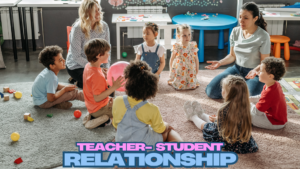
Teacher-student relationships are the cornerstone of effective education systems, shaping not only academic outcomes but also social and emotional development. In South Korea, where educational rigor and societal expectations are deeply intertwined, the quality of teacher-student relationships takes on heightened significance. This blog explores the importance of these relationships, the factors influencing their quality, methods of assessment, and actionable steps to enhance them.
The Importance of Teacher-Student Relationships
A positive teacher-student relationship is essential for creating an environment conducive to learning. Research consistently highlights the following benefits:
- Improved Academic Performance: Students with supportive teachers are more engaged, which correlates to higher academic achievement. Studies in South Korea have shown that positive teacher-student dynamics can improve performance in critical subjects like mathematics and science.
- Enhanced Emotional Well-being: Teachers who provide emotional support help students navigate stress and build resilience, especially important in South Korea’s high-pressure academic environment.
- Increased Classroom Participation: Positive relationships foster a sense of belonging, encouraging active participation, which is crucial for competitive exams and university admissions.
- Long-term Benefits: Such relationships often lead to better social skills and higher self-esteem, crucial for lifelong success.
Factors Influencing the Quality of Teacher-Student Relationships
Several factors contribute to the dynamics of teacher-student relationships. Understanding these factors is the first step toward fostering meaningful connections:
- Cultural Norms: In South Korea, traditional hierarchies emphasize respect for authority. While this can strengthen discipline, it may limit open communication.
- Classroom Environment: A positive, inclusive environment encourages trust and collaboration. Programs like the “Happy School Project” aim to create such environments in Korean schools.
- Teacher Attitudes: Empathy, patience, and consistency on the part of teachers significantly impact relationships Read about the Role of Teachers in the Field. . Teachers trained under the Korean Ministry of Education’s “Teacher Capacity Building” program have demonstrated marked improvements in these areas.
- Student Behavior: Respectful and cooperative students contribute to a more positive dynamic. Initiatives like “Character Education” emphasize building these traits in students.
- Parental Involvement: Engaged parents often bridge gaps between teachers and students, reinforcing trust and understanding. Parent-teacher meetings are widely practiced across South Korean schools.
Methods for Assessing Teacher-Student Relationships
Quantifying the quality of teacher-student relationships can be challenging, but several methods have proven effective:
- Surveys and Questionnaires: Tools such as the Student-Teacher Relationship Scale (STRS) can provide insights into perceived closeness, conflict, and dependency. Surveys conducted by the Korean Educational Development Institute (KEDI) frequently assess such dynamics.
- Classroom Observations: Observers assess interactions for signs of respect, warmth, and cooperation. Studies by Seoul National University have employed this method to evaluate relationship quality.
- Feedback Mechanisms: Both students and teachers can provide qualitative feedback to highlight strengths and areas for improvement.
- Behavioral Assessments: Tracking changes in student engagement, participation, and academic performance offers indirect indicators of relationship quality.
Enhancing Teacher-Student Relationships

To improve these relationships, schools, educators, and policymakers can implement various strategies:
- Professional Development for Teachers: Training programs focused on emotional intelligence and communication skills equip teachers to connect with students effectively. The Korean Education Training Institute has initiated workshops to address this need.
- Cultural Sensitivity Training: Understanding diverse backgrounds can help bridge cultural gaps and foster inclusivity.
- Student Mentorship Programs: Pairing students with mentors creates additional layers of support. Programs like “Wee Project” in Korea emphasize mentorship to address academic and emotional challenges.
- Open Communication Channels: Regular one-on-one meetings between teachers and students encourage open dialogue and mutual understanding.
- Parental Collaboration: Schools can organize workshops and meetings to align teacher and parent expectations.
Challenges in Fostering Positive Relationships
Despite the best efforts, certain challenges persist in developing strong teacher-student relationships in South Korea:
- High Student-Teacher Ratios: Large class sizes often limit individual attention.
- Academic Pressure: The focus on test scores can overshadow emotional and social development.
- Cultural Barriers: Hierarchical norms may discourage students from expressing concerns or seeking help.
Case Study: Successful Initiatives in South Korea
Several schools in South Korea have implemented programs to strengthen teacher-student relationships. For instance, the “Mentor Teacher” initiative pairs students with dedicated teachers for academic and emotional guidance. Reports indicate increased student satisfaction and improved academic outcomes. Another example is the “Wee Center” program, which provides counseling and emotional support, demonstrating how a supportive framework can significantly enhance teacher-student interactions.
Conclusion
Teacher student relationships are pivotal in shaping the educational experience. In South Korea, addressing cultural, institutional, and individual barriers can significantly enhance these relationships. Schools, educators, and policymakers must prioritize initiatives that foster trust, respect, and understanding, ensuring that students thrive academically and emotionally.